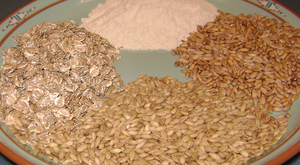
Photograph of 4 gluten sources. Top: High-gluten wheat flour. Right: European spelt. Bottom: Barley. Left: Rolled rye flakes. (Photo credit: Wikipedia)
Just like people, dogs can have allergies or food sensitivities. In fact, allergies and the symptoms they induce have become the top reason that pet owners visit their veterinarian. Often, medications are prescribed to control symptoms, but this may not be the only option. With medications comes the possibility for other side effects, and medications only treat the symptoms, not the problem. The best way to treat your dog’s allergies is to isolate the allergen and try several dog allergy remedies” natural dog allergy remedies.
Causes Causes of allergies can range from:
- Flea and tick bites
- Foods such as gluten, corn, milk, eggs
- Environmental irritants like grass, dust, mold, or cleaning products
Gluten allergies, or celiac disease, are quite common in dogs and easily treatable. Gluten is found in wheat and is a protein. It is an ingredient that is found in a large variety of dog foods. If untreated, it can cause several symptoms that are at best irritating for your dog, and at worst, life threatening.
Symptoms Symptoms to gluten and other allergens are usually first noticed on the skin of your pet. They may scratch constantly and the appearance of red raised bumps is not uncommon. Red itchy eyes are another symptom. Bowels may become affected when dogs intestines become inflamed, and they may experience diarrhea. Nutrients cannot be absorbed and your pet may lose weight and become cranky. Sneezing and snoring due to inflamed throat and sinuses are a possibility.
Remedies The first step in treatment is the isolation of the allergen. Your local vet can draw your pet’s blood to determine what they are allergic to, or this can be done by a process of elimination. Allergies are forever, and the best treatment is to eliminate the culprit from your dog’s environment or food source. If gluten sensitivity is the issue, find a gluten free food for your pet, there are a variety of choices available, or research making your own dog food. That way you know exactly what is in it. Treat skin symptoms by bathing your pet often, but be careful here. Some pet shampoos have fragrances or other ingredients that will irritate the skin. Instead, give your pet a bath in a combination of oatmeal and warm water to soothe itchy skin and rashes. Include essential fatty acids into your dog’s diet in the form of flaxseed or salmon oils. These are known to reduce symptoms from allergic reactions and boost immunity so allergies are kept to a minimum. Keep your pet indoors if the allergy source is grass or pollen. Vacuum often and wipe your pet down so allergens do not stick to the skin.
Pet allergies are becoming increasingly common, especially allergies to gluten containing foods. While medications like antihistamines or steroidal creams may be necessary for extreme cases, natural remedies may be just as effective, and safer, than meds. Most people love their dogs and treat them like one of the family, so maintaining their health is an important step in having a happy pet that will be around for years to come.